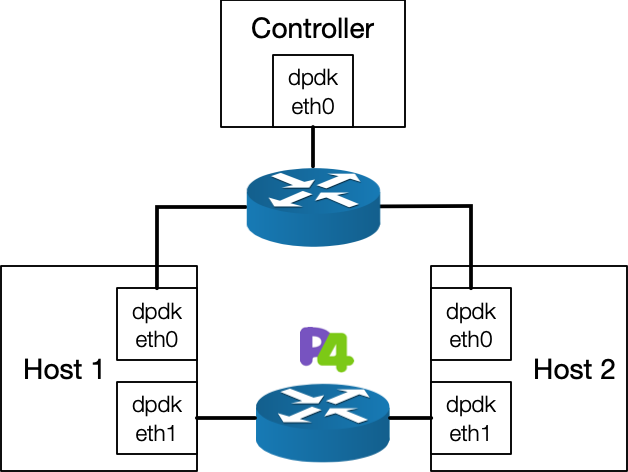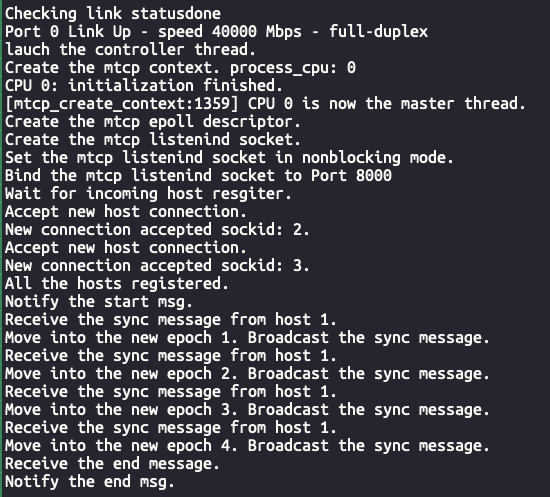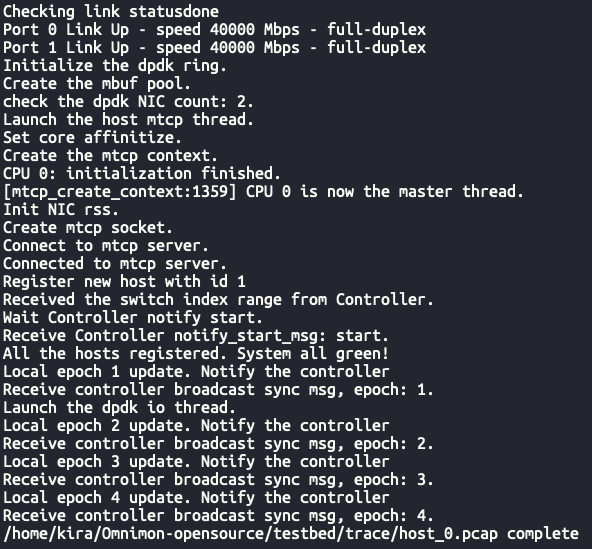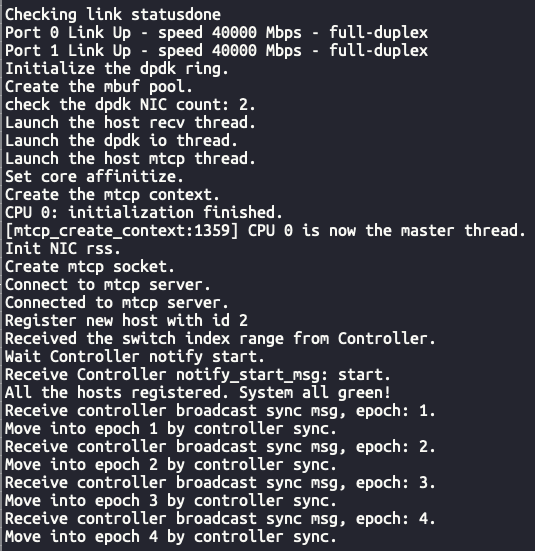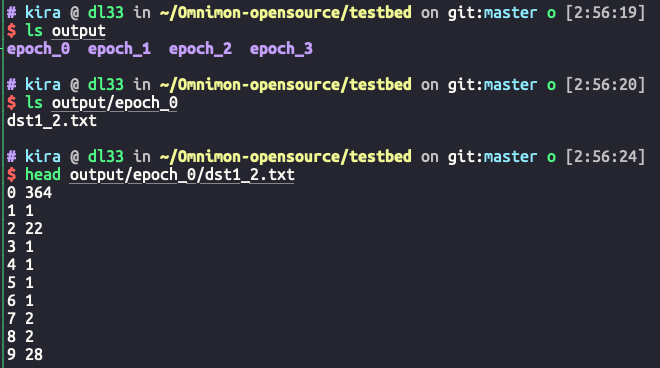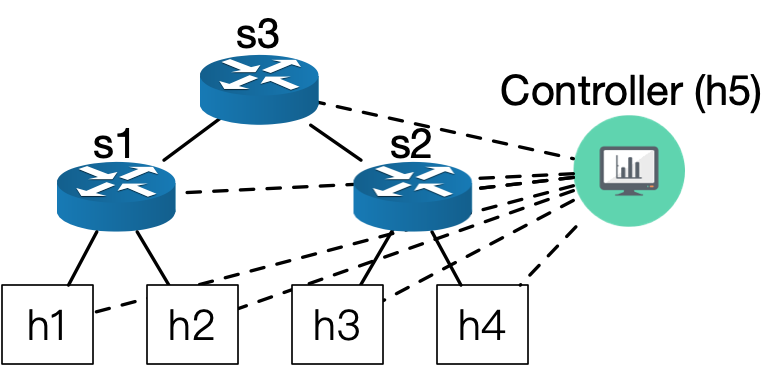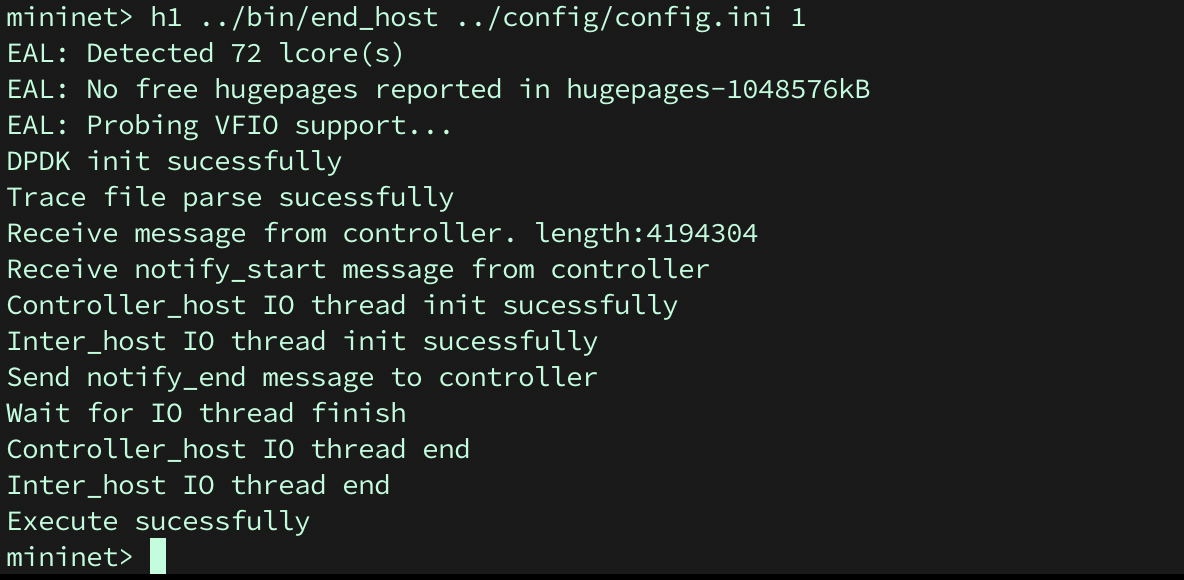This repository contains 3 parts:
- Testbed programs, including:
- End-host program
- Controller program (collective analysis not included)
- Dummy P4 program that can be run atop Tofino. We do not provide the full program due to the restriction of Barefoot NDA.
- MiniNet programs that simulate OmniMon
- Collective analysis that works for both testbed and MiniNet programs
The testbed programs include:
- bin: directory that contains executable files after compilation
- build: intermediate result directory generated by cmake and compilation
- config: Omnimon configuration files
- output: the output directory generated when Omnimon running
- p4: the dummy P4 program which can run atop tofino
- src: Omnimon source code directory
- trace: a processed small-scale CAIDA trace for testing
- CMakeLists.txt
We require the following depedencies to run OmniMon testbed programs.
-
cmake >= 3.12
-
autoreconf:
sudo apt-get install autoconf -y -
libpcap:
sudo apt-get install libpcap-dev -y -
libnuma:
sudo apt-get install libnuma-dev -y -
libgmp:
sudo apt-get install libgmp-dev -y -
iniparser:
git clone http://github.com/ndevilla/iniparser.git
cd iniparser
make
sudo cp lib* /usr/lib/
sudo cp src/*.h /usr/include- mtcp:
git clone https://github.com/mtcp-stack/mtcp.git
cd mtcp
git submodule init
git submodule update
sudo ifconfig eth0 down # Suppose one dpdk NIC is eth0
sudo ifconfig eth1 down # Suppose another one dpdk NIC is eth1
./setup_mtcp_dpdk_env.sh [<path to $RTE_SDK>]
- Press [15] to compile x86_64-native-linuxapp-gcc version
- Press [18] to install igb_uio driver for Intel NICs
- Press [22] to setup 2048 2MB hugepages
- Press [24] to register the Ethernet ports
- Press [35] to quit the tool
sudo ifconfig dpdk0 10.0.0.31/24 up # Assign ip to the mtcp dpdk0, it is recommended to use 10.0.0.0/24 network segments
sudo ifconfig dpdk1 10.0.1.31/24 up # Assign ip to the mtcp dpdk1, it is recommended to use 10.0.1.0/24 network segments
export RTE_SDK=`echo $PWD`/dpdk
export RTE_TARGET=x86_64-native-linuxapp-gcc
autoreconf -ivf
./configure --with-dpdk-lib=$RTE_SDK/$RTE_TARGET
make -j 4Our testbed requires three servers and two switches, connected as shown in the figure below.
-
Server:
- One server acts as the OmniMon controller, which requires one NIC that supports DPDK driver. (Here lists the devices that can work with DPDK drivers)
- The other two servers are used as sender and receiver, both of which need to have either two NICs or one dual-port NIC. All NICs need to support the DPDK driver.
-
Switch:
-
One switch is used to deploy the OmniMon dataplane program, which needs to support P4.
-
Another switch is used for the controller to connect the hosts in the network.
-
OmniMon contains the following configuration files. You need to modify these files to compile and run the OmniMon testbed program. All the files are in the ${omnimon_dir}/testbed/config directory.
-
config.ini (the configuration file of OmniMon)
The complete configuration parameters of OmniMon are shown in the table below. The option marked with * means that you have to set according to the operating environment.
Field Meaning [Common] * project_path the absolute path of the Omnimon testbed project trace_pcap_list file listing all raw pcap files key_len flow key length in bit (default 5-tuple) interval_len epoch length (default 100ms) [Host] host_max_key max flows of each epoch in the test trace max_events mtcp events queue length process_cpu the logical core id to run the mtcp thread (default 0) [Controller] * ip_addr the ip address you assigned to dpdk0 of Controller when installing mtcp listen_port the listening port of Controller max_events mtcp events queue length process_cpu the logical core id to run the mtcp thread (default 0) -
mtcp_om_[host/controller].conf (the configuration file of mtcp stack)
We provide different configuration files for OmniMon's controller and host which are necessary for mtcp stack. Our program will automatically read the corresponding configuration file under the config directory and you have no need to modify the file content.
-
arp.conf (required by mtcp stack)
-
You need to list all MAC address of dpdk0 of each server after installing the mtcp stack.
-
Mtcp thread will read the arp.conf automatically. Do not change the file path.
-
-
route.conf (required by mtcp stack)
- The route rules for mtcp stack. If you use the recommended network segment, you can directly use the file without modification.
- Mtcp thread will read the route.conf automatically. Do not change the file path.
To compile the Omnimon executable files, you need to modify the MTCP_DIR variable in the ${omnimon_dir}/testbed/CMakeLists.txt according to your environment at first.
set(MTCP_DIR <PATH to mTCP>)
After updating the CMakeLists.txt, you can compile the executable files using following commands on each server. The compilation result will be output to the ${omnimon_dir}/testbed/bin directory.
cd ${omnimon_dir}/testbed/build
cmake ..
make controller
make host_rx
make host_txWe provide a simple version of OmniMon data plane P4 program. The function of this program mainly includes parsing the header of OmniMon and completing the basic forwarding function. We now hide the counting part that requires the stateful ALU of Tofino, due to the Barefoot NDA.
When the program is deployed, you need to configure the port and add the flow entry. Note that for the CAIDA trace we provide, we have added an Ethernet header to cooperate with our dummy P4 program for Layer 2 forwarding. The dst mac address is 9c:69:b4:60:ef:c9. You can use this address to add flow entry of the forward table.
Make sure the current directory is ${omnimon_dir}/testbed, run
sudo ./bin/controller config/config.iniMake sure the current directory is ${omnimon_dir}/testbed
On sender node, run:
sudo ./bin/host_tx config/config.ini 1On receiver node, run:
sudo ./bin/host_rx config/config.ini 2We show the working process and output file of Omnimon testbed program in this part. Here we have omitted a lot of output content of the mTCP stack.
We first run Omnimon's controller:
Next, we run host_tx and host_rx in sequence: The running process of the host_tx (sender) is shown in the figure:
The running process of the host_rx (receiver) is shown in the figure:
After the program ends, the result file can be viewed in the ${omnimon_dir}/testbed/output directory. The following figure uses the receiver as an example.
We provide an OmniMon prototype based on Mininet and p4-behavioral model.
The testbed programs include:
- bin: directory that contains executable files after compilation
- build: intermediate result directory generated by cmake and compilation
- config: Omnimon configuration files
- output: the output directory generated when Omnimon running
- p4: the dummy P4 program which can run atop bmv2
- src: Omnimon source code directory
- trace: a processed small-scale caida trace for testing
- CMakeLists.txt
We require the following dependencies to run OmniMon Mininet programs.
-
cmake >= 3.12
-
libpcap:
sudo apt-get install libpcap-dev -y -
libzmq:
sudo apt-get install libzmq3-dev -
libnuma:
sudo apt-get install libnuma-dev -y -
libconfig:
sudo apt-get install libconfig-dev -y -
dpdk:
cd /usr/local/src
sudo wget http://fast.dpdk.org/rel/dpdk-17.11.10.tar.xz
sudo tar xvf dpdk-17.11.10.tar.xz
sudo ln -s dpdk-stable-17.11.10 dpdk
export RTE_SDK=/usr/local/src/dpdk
cd dpdk/usertools
sudo -E ./dpdk-setup.sh
- Press [14] to compile x86_64-native-linuxapp-gcc version
- Press [17] to insert IGB UIO module
- Press [21] to setup 4096 2MB hugepages
- Press [34] to quit the toolFor the Mininet and bmv2 environments, you can follow the instructions on the official site and install the dependencies easily.
bvm2 : https://github.com/p4lang/behavioral-model#dependencies
p4c : https://github.com/p4lang/p4c#getting-started
Mininet : http://mininet.org/download/
There are four hosts (h1, h2, h3, h4), three p4 switches (s1, s2, s3) and a controller(h5) in the network. The prototype consists of three parts, which run on the host, switch and controller, respectively.
You need to modify the following configuration files to compile and run the OmniMon Mininet program.
mininet/P4/env.sh
You should change the value of BMV2_PATH to the correct path of bmv2 folder
mininet/config/config.ini
The complete configuration parameters of Mininet verison OmniMon are shown in the table below. The option marked with * means that you have to set according to the operating environment.
| Field | Meaning |
|---|---|
| [Common] | |
| * trace_dir | directory of the test trace |
| trace_pcap_list | file listing all raw pcap files |
| key_len | flow key length in bit (default 5-tuple) |
| interval_len | epoch length (default 100ms) |
| host_max_key | max flows of each epoch in the test trace |
| [Host] | |
| zmq_data_server | the ip address you assigned to controller(default h5: tcp://10.0.0.5) |
| dpdk_args | Dpdk init arguments |
After modifying the configuration file, you can compile end_host and comtroller executable files using following commands.
cd ${omnimon_dir}/mininet/build
cmake ..
make end_host
make controller
make receiver- Terminal-1 run the following command to start the simulated topologic and compile and run the P4 code of OmniMon:
cd ${omnimon_dir}/mininet/P4
./run_bmv2.sh- Terminal-2 run the following command to add flow_table for P4 switches in Mininet:
cd ${omnimon_dir}/mininet/P4
./set_switches.shTerminal-1(with Mininet runnning on it) Run:
h5 ../bin/controller ../config/config.ini &Terminal-1 Run:
h2 ../bin/receiver 2 &
h3 ../bin/receiver 3 &
h4 ../bin/receiver 4 &
h1 ../bin/end_host ../config/config.ini 1 When the program ends(as picture below shows), the end_host result will be automatically written in mininet/output/hosts.
To generate switch result, you need run following commands.
cd ${omnimon_dir}/mininet/P4
python read_register.pySwitch result will also be written in mininet/output/switch.
This repo implements the collective analysis of OmniMon individually. The analysis program works for results generated by either testbed program or Mininet program.
libeigen: sudo apt-get install libeigen3-dev -y
Each epoch has a directory of input files for the analysis. These files are generated by switches and end-hosts.
The files include:
- device_ids.txt: specify the ids of all end-hosts and switches
- path.txt: specify the expected path along which each flow travels
- src_X: output file of each source end-host whose id is X. This file containing all flows sent from end-host X.
- dst_X_Y: output file of each destination end-host. This file includes flow values that are sent from end-host X and received by end-host Y.
- sX.txt: output of switch X.
We provide a simple sample in directory [collective_analysis/sample].
- Enter collective analysis directory:
cd collective_analysis
- Compile
make
- Run
./main [dir]
Here, dir is the input directory.
In our sample example, some packets of a flow are dropped by Switch 3. The result is:
